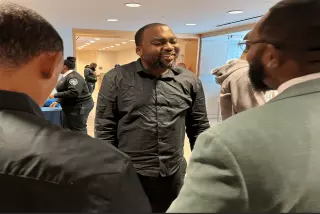Grown-Up Gratitude From a 9-Year-Old
- Share via
There’s pain in this world. Sometimes we use the word so casually, however, that we forget people actually suffer from day-in, day-out chronic pain. Life becomes very, very difficult. For them, pain isn’t a concept; it’s a suit of heavy, stifling armor they can’t even take off when they go to bed. That, in fact, is what Collin Sellers’ world had turned into by March 2003. He was only 9 years old at the time.
Riding in a car hurt him. It hurt when his mom hugged him. Cutting meat with a knife and fork sent an ache through him. Instead of walking around the house, he’d sometimes be pulled around while sitting on a pillow. Loud music, for some reason, made his jaw hurt and sent pain coursing through his body. Because of it all, he was living an abnormal life and missing out on what most of us would call a childhood.
He’s had a number of unpleasant diagnoses with long names, but in layman’s terms, Collin was determined to be acutely sensitive to pain and burdened with fatigue. Doing even normal kid stuff would land him in bed for three days of recovery.
All this downer information is a necessary prelude for the great big happy ending that occurred this week at St. Jude Medical Center in Fullerton. Collin’s parents, Donna and Steve, had brought him to the hospital in March 2003 and put him in a pain-management program that combined treatment for physical and psychological problems -- the twin terrors of chronic-pain sufferers. I don’t have the space to explain the program’s nuances, but it worked. Collin’s pain rating, as determined by the hospital staff, now typically settles between 3 and 5 instead of its former top-of-the-scale 10.
But even that isn’t the end of the story.
First things first. Here’s how Collin, now 11 and a remarkably articulate sixth-grader at Don Juan Avila Middle School in Aliso Viejo, describes his previous world of hurt: “I had my life planned out. I thought it was always going to be like that. I thought it was going to end up that way. Nothing was going right with my life. I couldn’t hang out with my normal friends. I could barely go to school. I couldn’t do anything.”
Such was his sense of hopelessness that he told his parents he didn’t want to join any stupid hospital program. “I didn’t like the sound of it,” he says. “I wanted to get out of there, literally.”
He stayed. Soon enough, he says, the physical therapy and psychological counseling prompted a realization: “This is sort of working.”
The guts of the therapy took about a year. For the last year, Collin has stayed in touch with team members as need be. He formed strong bonds with them.
And that leads us to the real ending.
Earlier this week, Collin and his parents returned to St. Jude for a little get-together. To show his gratitude, Collin helped raise more than $900 in donations from friends, family and neighbors to buy things for the hospital. Some of the things were displayed on a table in the rehabilitation area: a fish tank, some gardening equipment, a Frisbee, a soccer ball, computer games.
The idea, which the Sellers family worked on together, was to give something back to the hospital. Collin says it better than I could: “They sort of changed my life, so I thought I’d give back and change theirs a little.”
Hospital spokeswoman DruAnn Copping says it was a first. “No youngster has ever reciprocated in this way.” In return for his generosity, the hospital named a pillar in the rehab area after Collin.
Donna Sellers exults when talking about the program. Collin’s underlying ailment remains, she says, “but it’ll be fine. He’ll have a life and, knowing he can push through the pain, he’ll do well in life.”
Collin says the hospital ceremony was “pretty cool.” With that said, I ask how the future looks to him now. “It looks very good,” he says. “It looks like a whole new life for me.”
Dana Parsons can be reached at (714) 966-7821 or at dana.parsons@latimes.com. An archive of his recent columns is at www.latimes.com/parsons.


